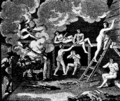Portal:Nudity
Introduction

Nudity is the state of being in which a human is without clothing. While estimates vary, for the first 90,000 years of pre-history, anatomically modern humans were naked, having lost their body hair and living in hospitable climates. As humans became behaviorally modern, body adornments such as jewelry, tattoos, body paint and scarification became part of non-verbal communications, indicating a person's social and individual characteristics. Indigenous peoples in warm climates used clothing for decorative, symbolic or ceremonial purposes but were often nude, having neither the need to protect the body from the elements nor any conception of nakedness being shameful. In many societies, both ancient and contemporary, children might be naked until the beginning of puberty. Women may not cover their breasts if they were associated with nursing babies more than with sexuality.
In the ancient civilizations of the Mediterranean, from Mesopotamia to the Roman Empire, proper attire was required to maintain social standing. The lower classes might possess a single piece of cloth that was wrapped or tied to cover the lower body; the lowest classes including slaves might be naked. However, through much of Western history until the modern era, people of any status were also unclothed by necessity or convenience when engaged in labor and athletics; or when bathing or swimming. Such functional nudity occurred in groups that were usually but not always segregated by sex. Although improper dress might be socially embarrassing, the association of nudity with sin regarding sexuality began with Judeo-Christian societies, spreading through Europe in the post-classical period. Traditional clothing in temperate regions worldwide also reflect concerns for maintaining social status and order, as well as by necessity due to the colder climate. However, societies such as Japan and Finland maintain traditions of communal nudity based upon the use of baths and saunas that provided alternatives to sexualization.
The spread of Western concepts of modest dress was part of colonialism, and continues today with globalization. Contemporary social norms regarding nudity reflect cultural ambiguity towards the body and sexuality, and differing conceptions of what constitutes public versus private spaces. Norms relating to nudity are different for men than they are for women. Individuals may intentionally violate norms relating to nudity; those without power may use nudity as a form of protest, and those with power may impose nakedness on others as a form of punishment. (Full article...)
Selected general article

A nude beach, sometimes called a clothing-optional or free beach, is a beach where users are at liberty to be nude. Nude beaches usually have mixed bathing. Such beaches are usually on public lands, and any member of the public is allowed to use the facilities without membership in any movement or subscription to any personal belief. The use of the beach facilities is normally anonymous. Unlike a naturist resort or facility, there is normally no membership or vetting requirement for the use of a nude beach. The use of nude beach facilities is usually casual, not requiring pre-booking. Nude beaches may be official (legally sanctioned), unofficial (tolerated by residents and law enforcement), or illegal.
The number of nude beaches in some countries is relatively low, and they are generally located some distance away from the city. Access is at times more difficult than at a regular beach and the facilities at these beaches tend to be very basic with a few notable exceptions. In other countries, like Denmark, most beaches are clothing-optional. Nude swimming is one of the most common forms of nudity in public. A nude beach should not be confused with a topless beach (or top-free beach), where upper body clothing is not required for women or men, although a swimming costume covering the genital area is required for both men and women. A nude beach should be considered as a clothes-free beach.
Nude beaches tend to be separate or isolated physically from non-nude bathing areas. In other instances people maintain a comfortable space between beach users. Signage is often used to warn unfamiliar beach users about the specially designated areas on the beach. This accommodates people who are not comfortable with nudity, as well as nude beach users who do not like to be watched by clothed individuals, particularly those engaged in voyeurism. (Full article...)
Did you know...
- ... that Ettore Sottsass's design of the Olivetti Valentine typewriter was inspired by the pop-art nudes of Tom Wesselmann?
- ... that Will Wood performed nude for the music video of a song on SELF-iSH?
- ... that sales from Dieux du Stade, a nude calendar produced by the French professional rugby union club Stade Français featuring photos of its players, helped to finance the club for many years?
- ... that the destroyed plinth of Gürdal Duyar's nude sculpture Güzel İstanbul contained reliefs of a fig, a pomegranate, a honeysuckle and a bee to represent different aspects of Istanbul?
- ... that according to one Turkish artist, a nude sculpture by Gürdal Duyar almost dissolved the 37th government of Turkey?
- ... that film critic and censor D. I. Suchianu wanted Romanian moviegoers to cease "falling asleep whenever they're not shown a naked breast [or] a hip that's getting some action"?
- ... that after women's suffrage in Switzerland was approved in a referendum in 1971, the tabloid Blick sported a cover with a naked blonde and the headline "Thank you for the Roses"?
- ... that Chris Ernst stripped naked in 1976 with her Yale University teammates to protest the lack of showers for the women's rowing crew?
Need help?
Do you have a question about Nudity that you can't find the answer to?
Consider asking it at the Wikipedia reference desk.
Get involved
For editor resources and to collaborate with other editors on improving Wikipedia's Nudity-related articles, see WikiProject Nudity.
Subtopics
Associated Wikimedia
The following Wikimedia Foundation sister projects provide more on this subject:
-
Commons
Free media repository -
Wikibooks
Free textbooks and manuals -
Wikidata
Free knowledge base -
Wikinews
Free-content news -
Wikiquote
Collection of quotations -
Wikisource
Free-content library -
Wikiversity
Free learning tools -
Wiktionary
Dictionary and thesaurus







































































